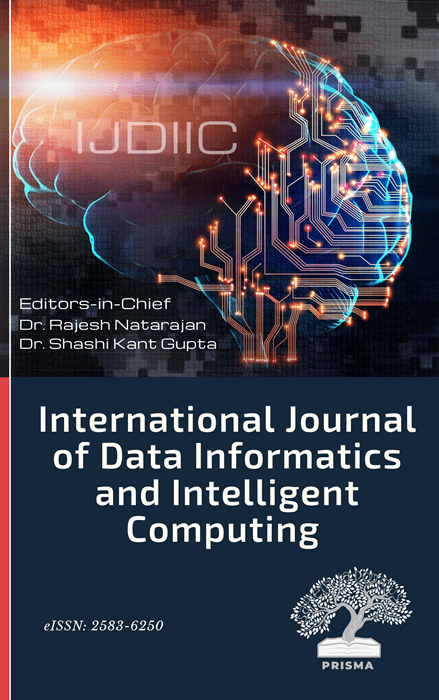Empowering Cyber-Physical Systems through AI-driven Fusion for Enhanced Health Assessment
DOI:
https://doi.org/10.59461/ijdiic.v3i3.127Keywords:
Cyber-Physical Systems (CPS) , Health Assessment, Z-score Normalization, Deep Learning (DL)Abstract
Cyber-physical systems (CPS) for improved health assessment currently face multiple challenges with managing and treating health issues, and there is an uncontrollable amount of risk, as well as the requirement for effective artificial intelligence (AI) algorithms that can manage complex and dynamic health data. In this paper, we provide Hybrid Support Vector Machines fine-tuned Spatial Transformer Networks (HSVM+FSTN) for the prediction of enhanced health assessment. 299 cardiac failure patients were gathered in the Kaggle source, and the data was pre-processed using Z-score normalization. Linear discriminant analysis was employed for feature extraction. Classification was provided for both the machine learning (ML) and deep learning (DL) techniques. The performance analysis was carried out on the Python platform. The proposed HSVM+FSTN performance was more significant when compared to existing techniques in terms of sensitivity (95.4%), accuracy (97.2%), specificity (94.4%), and precision (96.7%).
Downloads
References
P. Radanliev, D. De Roure, M. Van Kleek, O. Santos, and U. Ani, “Artificial intelligence in cyber physical systems,” AI Soc., vol. 36, no. 3, pp. 783–796, Sep. 2021, doi: 10.1007/s00146-020-01049-0.
E. Refaee et al., “Secure and Scalable Healthcare Data Transmission in IoT Based on Optimized Routing Protocols for Mobile Computing Applications,” Wirel. Commun. Mob. Comput., vol. 2022, pp. 1–12, Jun. 2022, doi: 10.1155/2022/5665408.
R. Natarajan, G. H. Lokesh, F. Flammini, A. Premkumar, V. K. Venkatesan, and S. K. Gupta, “A Novel Framework on Security and Energy Enhancement Based on Internet of Medical Things for Healthcare 5.0,” Infrastructures, vol. 8, no. 2, p. 22, Feb. 2023, doi: 10.3390/infrastructures8020022.
J. Huang, M. D. Seck, and A. Gheorghe, “Towards trustworthy smart cyber-physical-social systems in the era of Internet of Things,” in 2016 11th System of Systems Engineering Conference (SoSE), IEEE, Jun. 2016, pp. 1–6. doi: 10.1109/SYSOSE.2016.7542961.
Shivi Chaturvedi, “Clinical Prediction on ML based Internet of Things for E-Health Care System,” Int. J. Data Informatics Intell. Comput., vol. 2, no. 3, pp. 29–37, Sep. 2023, doi: 10.59461/ijdiic.v2i3.76.
Z. Shen, F. Ding, A. Jolfaei, K. Yadav, S. Vashisht, and K. Yu, “DeformableGAN: Generating Medical Images With Improved Integrity for Healthcare Cyber Physical Systems,” IEEE Trans. Netw. Sci. Eng., vol. 10, no. 5, pp. 2584–2596, Sep. 2023, doi: 10.1109/TNSE.2022.3190765.
R. K. Kaushal et al., “Using Mobile Computing to Provide a Smart and Secure Internet of Things (IoT) Framework for Medical Applications,” Wirel. Commun. Mob. Comput., vol. 2022, pp. 1–13, Oct. 2022, doi: 10.1155/2022/8741357.
Shivi Chaturvedi, “IoT-Based Secure Healthcare Framework Using Blockchain Technology with A Novel Simplified Swarm-Optimized Bayesian Normalized Neural Networks,” Int. J. Data Informatics Intell. Comput., vol. 2, no. 2, pp. 63–71, Jun. 2023, doi: 10.59461/ijdiic.v2i2.59.
L. K. Ramasamy, F. Khan, M. Shah, B. V. V. S. Prasad, C. Iwendi, and C. Biamba, “Secure Smart Wearable Computing through Artificial Intelligence-Enabled Internet of Things and Cyber-Physical Systems for Health Monitoring,” Sensors, vol. 22, no. 3, p. 1076, Jan. 2022, doi: 10.3390/s22031076.
M. Alowaidi, S. K. Sharma, A. AlEnizi, and S. Bhardwaj, “Integrating artificial intelligence in cyber security for cyber-physical systems,” Electron. Res. Arch., vol. 31, no. 4, pp. 1876–1896, 2023, doi: 10.3934/era.2023097.
M. Adil, M. K. Khan, M. M. Jadoon, M. Attique, H. Song, and A. Farouk, “An AI-Enabled Hybrid Lightweight Authentication Scheme for Intelligent IoMT Based Cyber-Physical Systems,” IEEE Trans. Netw. Sci. Eng., vol. 10, no. 5, pp. 2719–2730, Sep. 2023, doi: 10.1109/TNSE.2022.3159526.
Z. Lv, D. Chen, R. Lou, and A. Alazab, “Artificial intelligence for securing industrial-based cyber–physical systems,” Futur. Gener. Comput. Syst., vol. 117, pp. 291–298, Apr. 2021, doi: 10.1016/j.future.2020.12.001.
S. G. Naqvi, S. Sheraz, I. Mehmood, and M. Yasin, “Cyber-physical Systems and Artificial Intelligence: The Role of Cyber Security, Machine Learning, Threats and benefits to Modern Economies and Industries,” Pakistan J. Humanit. Soc. Sci., vol. 11, no. 2, Jun. 2023, doi: 10.52131/pjhss.2023.1102.0454.
W. Doghri, A. Saddoud, and L. Chaari Fourati, “Cyber-physical systems for structural health monitoring: sensing technologies and intelligent computing,” J. Supercomput., vol. 78, no. 1, pp. 766–809, Jan. 2022, doi: 10.1007/s11227-021-03875-5.
A. Bagula, O. Ajayi, and H. Maluleke, “Cyber Physical Systems Dependability Using CPS-IOT Monitoring,” Sensors, vol. 21, no. 8, p. 2761, Apr. 2021, doi: 10.3390/s21082761.
M. R. and J. U. F. Akter, M.A. Kashem, M.M. Islam, M.A. Chowdhury, “A cyber-physical system (CPS) based heart disease prediction model for community clinics using machine learning classifiers,” J. Hunan Univ. Nat. Sci., vol. 48, no. 12, 2021.
A. Gupta and A. Singh, “An Intelligent Healthcare Cyber Physical Framework for Encephalitis Diagnosis Based on Information Fusion and Soft-Computing Techniques,” New Gener. Comput., vol. 40, no. 4, pp. 1093–1123, Dec. 2022, doi: 10.1007/s00354-022-00175-1.
Downloads
Published
How to Cite
Issue
Section
License
Copyright (c) 2024 Adnene Arbi, Mohammad Israr

This work is licensed under a Creative Commons Attribution-ShareAlike 4.0 International License.








